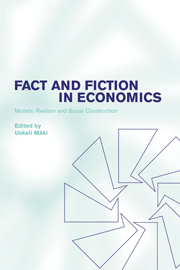1 - The dismal queen of the social sciences
Published online by Cambridge University Press: 22 September 2009
Summary
The factuality and fictionality of the “dismal queen”
Economics is a contested scientific discipline. Not only are its various theories and models and methods contested but, remarkably, what is contested is its status as a science. This becomes evident as soon as we think of some of the popular nicknames used of economics – such as “the dismal science” and “the queen of the social sciences.”
Suppose we take one of the characteristics of science to be the capability of delivering relevant and reliable information about the world. Suppose furthermore that this is not just a capability, but also a major goal and actual achievement of whatever deserves to be called by the name of “science.” How does economics do in this respect? This question is about as old as economics itself.
Many of those who are unimpressed think of economics as an arrogant and ignorant discipline, driven by methodological values that have little or nothing to do with the goal of delivering truthful information about the real world – values such as mathematical elegance and professional status. They might say that while economics may be the queen of the social sciences in regard to mathematical rigor, it is a failure in so far as its contact with the real world is concerned. Economics is largely a matter of formalized thin fiction and has little to do with the wonderful richness of the facts of the real world. It is the “dismal science,” as Thomas Carlyle once put it.
- Type
- Chapter
- Information
- Fact and Fiction in EconomicsModels, Realism and Social Construction, pp. 3 - 32Publisher: Cambridge University PressPrint publication year: 2002
References
- 25
- Cited by



